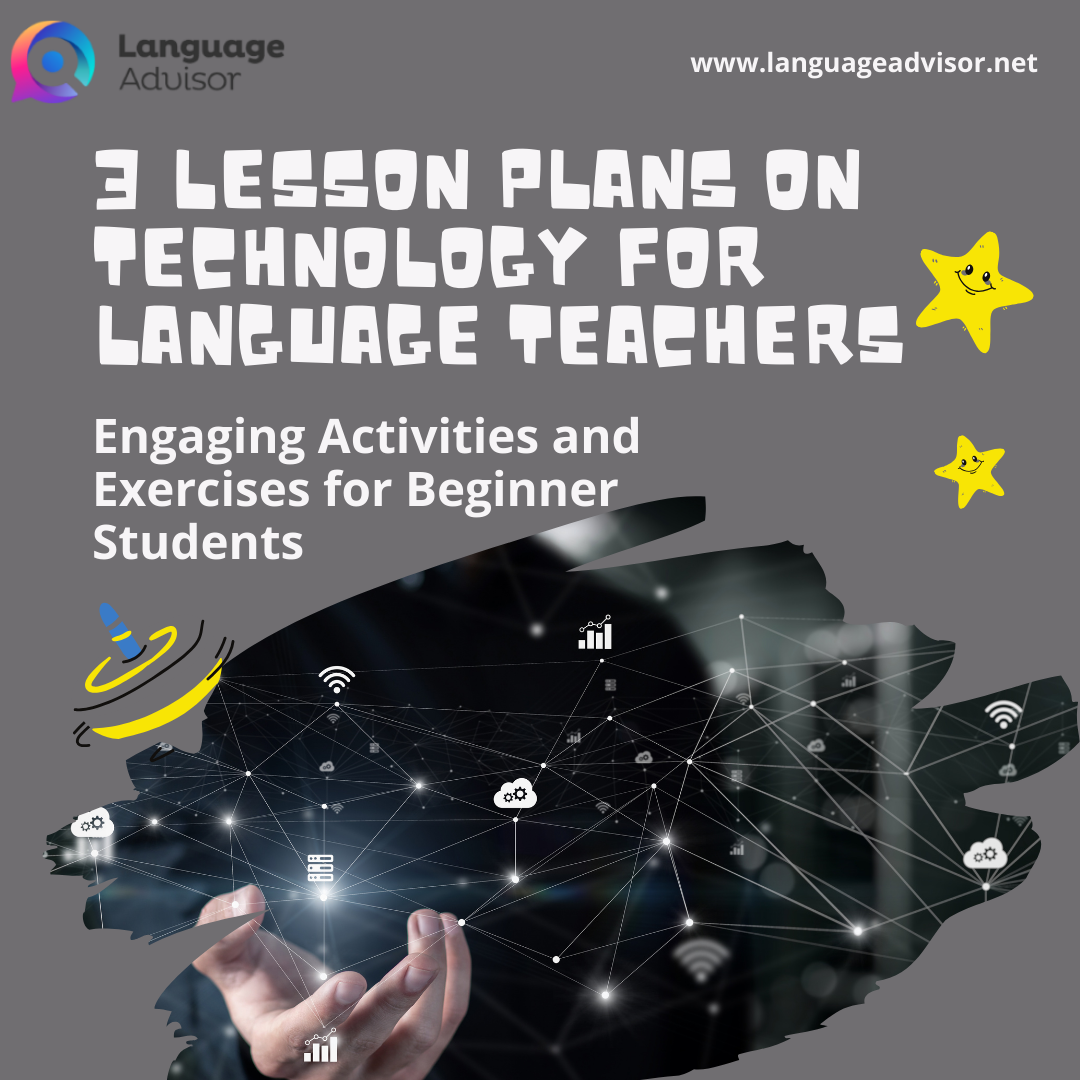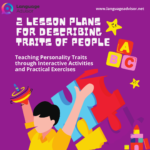3 Lesson Plans on Technology for Language Teachers. Engaging Activities and Exercises for Beginner Students
3 Lesson Plans on Technology for Language Teachers

3 Lesson Plans on Technology for Language Teachers
Welcome, language teachers! In this blog post, we provide three engaging lesson plans centered around the topic of technology. These plans are designed to help students at different stages of their learning journey enhance their vocabulary, grammar, and communication skills.
Let’s dive in!
Lesson 1: Introduction to Technology (Beginner)
Topic
Technology
Theme
Modern Uses of Technology
Grammar Point
Present tense
Aims
- Introduce new vocabulary relating to technology and its uses
- Provide context for the use of technology
- Improve students’ confidence and pronunciation
- Introduce the simple present tense
Timetable (Class Duration: 50 minutes)
- 5 mins: Warmer
- 10 mins: Vocabulary
- 15 mins: Practice
- 15 mins: Production
- 5 mins: Cooler
Warmer
- Pass around comical DIY mobile phones while music is playing. When the music stops, the person with the phone must stand up and have a conversation with the teacher using the phone.
Vocabulary Presentation
- Words: technology, internet, social media, communicate, laptop, mobile phone
Practice (T-T, T-S, S-T, S-S)
- Q: What do you do on the internet? A: I use social media on the internet.
- Q: Why do you use social media? A: I use social media to communicate with my friends.
- Q: Do you have internet on your mobile phone? A: No, I have internet on my laptop.
Production
- Students talk to a friend in English about the technology in their house.
- Worksheet: Word scramble (copy into book and complete exercise). Go through together as a class. Sentence scramble with practice sentences.
Cooler
- Draw pictures of technology from your house.
Planning Elements
- Materials and Aids: Flashcards, cue prompts, 2x DIY telephones, music and speaker.
- Presumed Knowledge: Basic vocab relating to technology (e.g., phone, internet, ATM, microphone).
- Anticipated Problems and Solutions: Lack of confidence (give praise), pronunciation (correct throughout class using stronger students).
Lesson 2: Frequency of Technology Use (Beginner Speaking/Writing)
Topic
Technology
Theme
How Often?
Grammar Point
Adverbs of frequency
Aims
- Reinforce technology vocabulary
- Introduce adverbs of frequency
- Provide context for the use of technology
- Improve students’ confidence and pronunciation
- Introduce adverbs of frequency
Timetable (Class Duration: 40-50 minutes)
- 5 mins: Warmer
- 10 mins: Vocabulary
- 15 mins: Practice
- 15 mins: Production
- 5 mins: Cooler
Warmer
- Show a pre-made picture board with examples of activities and their frequency (e.g., always, usually). Split the class into two teams. Have a person from each team come up and write/draw as many things as they can remember on the board. The team with the most items wins.
Vocabulary Presentation
- Words: always, usually, sometimes, occasionally, rarely, never
- Examples: “I ride my bike to school” (always), “I usually eat rice for dinner”, “I sometimes watch TV”, “I occasionally paint my nails”, “I rarely go to the hospital”, “I never go outside with no clothes on”.
- Place a pyramid on the board and elicit each word using the examples from the picture board.
Practice (T-T, T-S, S-T, S-S)
- Students practice saying each word, focusing on the pronunciation of “rarely”.
- Write on the board: ‘I usually…’, ‘I always…’. Have students finish the sentences with their own ideas.
- Explain the Q&A formula (e.g., “I occasionally play the guitar” = “How often do you play the guitar?”).
- Have students write questions for their answers.
Production
- Call out random students’ names and ask them “How often do you…?” questions.
Cooler
- Choose random names and write a sentence using the vocabulary words (e.g., “_____ usually…”). Have students finish the rest of the sentence and read it out.
Planning Elements
- Materials and Aids: Flashcards, cue prompts.
- Presumed Knowledge: Vocabulary from the previous lesson.
- Anticipated Problems and Solutions: Lack of confidence (give praise), pronunciation (correct throughout class using stronger students).
Lesson 3: Technology and Listening Skills (Listening)
Aims
- Reinforce vocabulary from previous lessons
- Develop and improve students’ listening skills
- Improve students’ confidence in both listening and speaking
Vocabulary
- always, usually, rarely, sometimes, occasionally, never
- social media, laptop, cell phone, internet
Timetable (Class Duration: 40-50 minutes)
- 5 mins: Prediction
- 10 mins: Skimming
- 15 mins: Reading the Story
- 10 mins: Scanning
- 10 mins: Inference
Prediction
- Show the title and cover picture of a story. Ask, “What do you think the story is about?” Get responses from the class and confirm the prediction.
Skimming
- Read key lines (1, 4, 6) to check if their predictions were correct.
Reading the Story
- One day, ________ and ________ receive a message on social media inviting them to a party in Bangkok.
- They were so happy, they used their cell phones to tell their friend _______ to come with them.
- ______ sometimes uses Facebook and sometimes uses Line but he is so busy that he rarely has time to read his messages.
- ________ is so excited to sing a song at the party. He always listens to music and loves to sing. It is his favorite hobby!
- _______ usually sings at home but the last time he sang at a party was 3 years ago!
- __________ and _______ go to ________’s house to help him practice singing.
- They log onto the internet using his laptop to find the karaoke lyrics.
- __________ occasionally makes a mistake, but soon with the help of his friends, his singing is perfect!
- ________ and _________ use Line to communicate that they are on their way to the party.
- The party is so much fun and everybody enjoys listening to the friends sing a song.
Scanning
- Ask detailed questions about the story (e.g., “How long ago was it since _______ sang a song?”, “Where is the party?”, “What social media does _______ use?”).
Inference
- Ask students to infer details from the story (e.g., “Do you think ________ is good at singing?”, “Do you think _________ likes to dance?”, “Why were they having a party?”).
Planning Elements
- Materials and Aids: Story text, questions.
- Presumed Knowledge: Vocabulary from previous lessons.
- Anticipated Problems and Solutions: Difficulty in understanding (repeat and simplify questions), low confidence (give praise and encouragement).

3 Lesson Plans on Technology for Language Teachers: Conclusion
These lesson plans will help engage your students with the topic of technology while developing their vocabulary, grammar, and communication skills.
Happy teaching!

Also check out these lesson plans












